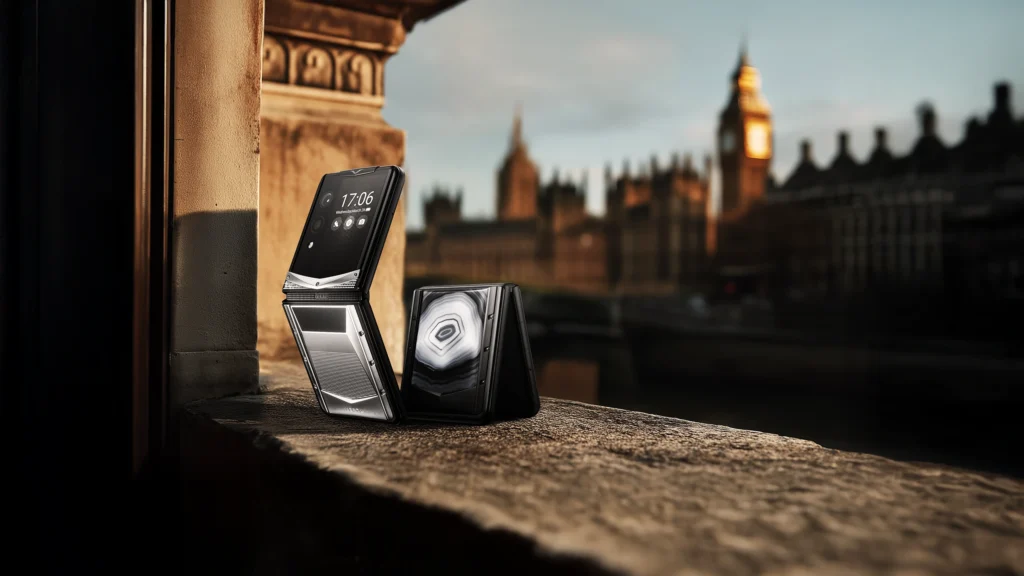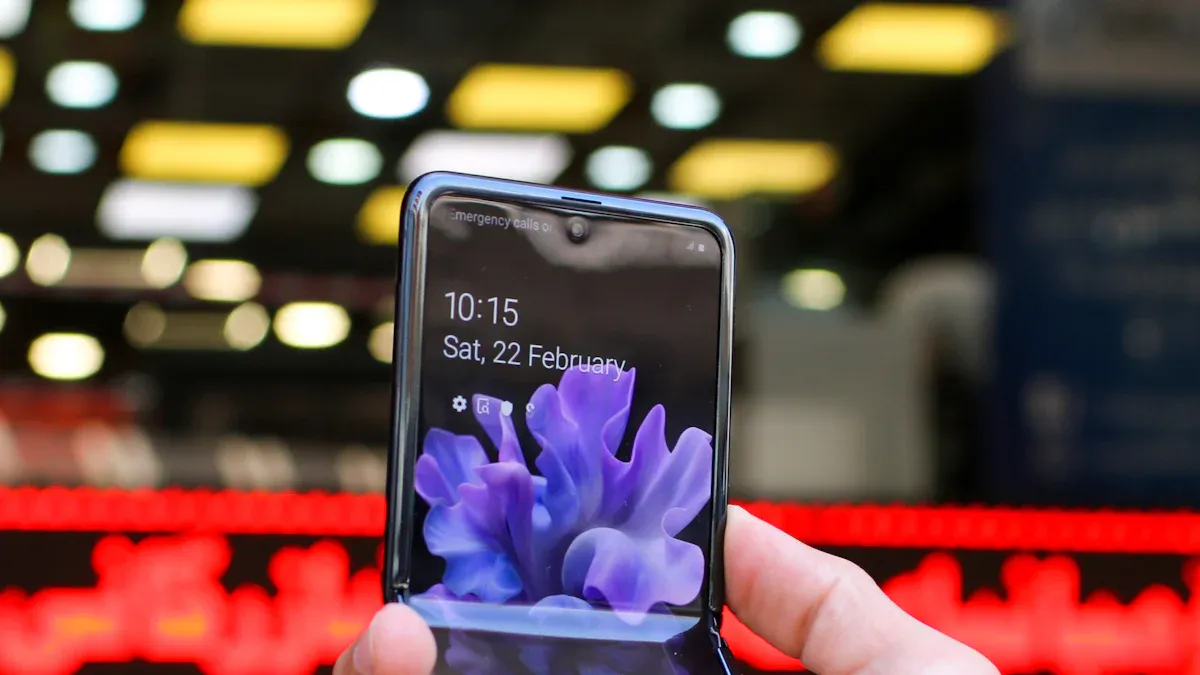
Have you ever thought about why Apple has no apple هاتف قابل للطي? While other brands rush to create new designs, Apple moves slower. Making a folding phone means solving big problems, like strong screens and good hinges. In 2024, iPhone sales grew less than 1%, showing Apple needs new ideas to excite buyers. A foldable iPhone could change high-end phones, but Apple wants it to work perfectly first. Apple’s careful plan shows it cares more about quality than being fast with new tech.
Key Takeaways
-
Apple values quality more than speed. It takes time to fix problems before making a foldable iPhone.
-
Foldable phones need to be strong. Apple works on tough screens and sturdy hinges for lasting use.
-
Good software is important. Apple wants apps to work well when folded or open for easy use.
-
Launch timing is important. Apple waits until people are ready, making sure its foldable iPhone meets needs and avoids mistakes.
-
Apple’s careful planning keeps its good name. By learning from others' errors, Apple wants to make a foldable phone that wows users.
Technological Challenges in Making a Foldable iPhone
Display Strength and Lifespan
Making a foldable iPhone means fixing screen durability issues. Flexible screens can crease, bubble, or get damaged by dust. These problems make foldable phones wear out faster and work less well. Screen protectors for foldable displays often don’t last long with daily use. Apple wants to create a screen cover that stays strong after years of folding. It must also keep the phone working well and looking great.
Hinge Design and Strength
The hinge is the most important part of a foldable phone. Apple needs to make sure the hinge is smooth and lasts a long time. A bad hinge can fold unevenly, break, or stop working. Apple will likely design a hinge that feels strong and works perfectly. This takes advanced engineering to make it both tough and flexible. The hinge also has to match Apple’s sleek and stylish designs. Creating this kind of hinge takes time and careful planning.
Battery Life and Power Use
Foldable phones need more power because of their bigger screens. Apple has to make sure its foldable iPhone has a battery that lasts long. Foldable phones often have large batteries and fast charging to help with power needs. Regular phones, with smaller screens, usually last longer on a charge.
|
Phone Type |
Battery Features |
|---|---|
|
Foldable Phones |
Big screens need more power, but large batteries and fast charging help. |
|
Regular Smartphones |
Smaller screens use less power, so batteries last longer. |
Apple is good at making batteries efficient. By using better battery tech and smart software, Apple can make a foldable phone that works well and lasts long.
Software Optimization for Foldable Screens
Making software for foldable screens is tricky. You might think apps would adjust easily, but they don’t. Developers must create software that works well folded or unfolded. If not, apps can act strangely and ruin your experience.
Did you know? Badly made apps can freeze or resize wrong. This makes switching between screen modes frustrating and harder to use.
One big problem is switching smoothly between folded and unfolded modes. When you open the phone, the screen should change instantly. If it doesn’t, you might see glitches or delays. Many apps are still made for flat screens, not foldable ones. Foldable phones need new coding and designs to work right.
Another issue is multitasking. Foldable screens let you use two apps at once. This sounds cool, but it’s hard to make work. Developers must stop apps from crashing or overlapping. You want multitasking to feel easy, but it takes a lot of effort to get it right.
|
Software Challenge |
Impact on User Experience |
|---|---|
|
Poor app resizing |
Apps may look stretched or cut off, making them harder to use. |
|
Delayed mode transitions |
Switching between modes feels slow or glitchy. |
|
Multitasking issues |
Using two apps can cause crashes or slowdowns. |
Foldable phones also need special operating systems. These systems should use the bigger screens in smart ways. Companies like Apple must design gestures and layouts that feel natural. Without these changes, foldable phones might feel awkward to use.
People say smooth interfaces are very important. Reports show bad apps make users unhappy. You might get annoyed if an app doesn’t adjust when you fold or unfold your phone. This is why Apple takes time to fix software before releasing a foldable phone.
In the end, good software is as important as good hardware. A foldable phone might look cool, but it needs smooth software to succeed. You deserve a phone that works perfectly, no matter how you use it. Apple’s focus on quality means they will solve these problems to give you the best experience.
Strategic Decisions Shaping Apple’s Folding Phone Approach
Apple’s Careful Way of Innovating
Apple always takes its time with new ideas. Instead of rushing, it works to make things better. This way, Apple ensures its products are top quality. Saikat Chaudhuri, an expert, says no company can always make big changes. Success comes from mixing small upgrades with big breakthroughs. Apple shows this by improving its products and business plans. This has helped Apple stay successful and make money.
For foldable phones, Apple’s high standards are key. The company focuses on making them strong and easy to use. While others release foldable phones quickly, Apple fixes problems like weak hinges and screens. This slow process shows Apple wants to make a foldable iPhone that impresses you.
Tip: When Apple finally makes a foldable iPhone, it will likely be the best in quality and performance.
Fitting the Foldable iPhone with Current Models
Adding a foldable iPhone is both exciting and tricky for Apple. It must fit well with other iPhones, like the iPhone Pro or Mini. A foldable iPhone might take attention away from these models. To prevent this, Apple needs to make it stand out.
One way Apple could do this is by targeting different users. The foldable iPhone might attract tech lovers and multitaskers. Regular iPhones would still be for people who want simple and affordable phones. This plan helps Apple grow without hurting its current products.
Apple has done this kind of balancing before. By carefully adding the foldable iPhone, Apple can stay innovative and meet different customer needs.
Pricing and Market Position
The price of the foldable iPhone will be very important. Experts think it could cost $2,000 to $2,500, making it the priciest iPhone yet. This high price shows Apple trusts its loyal fans and unique features.
Other foldable phones start at about $1,800. Apple’s higher price makes its phone feel more special. Barclays analyst Tim Long thinks it might cost around $2,300. Even though it’s expensive, many Apple fans will pay for the latest tech.
Did you know? Apple’s high prices often make its products feel more exclusive and wanted.
This pricing plan helps Apple keep its image as a top tech brand. The foldable iPhone’s price shows Apple knows how to mix new ideas with smart business moves. This keeps the company successful.
Protecting Long-Term Brand Reputation
Apple’s reputation depends on making products that are better than expected. People think of Apple as reliable, creative, and stylish. These qualities didn’t happen overnight. Apple has spent years earning trust, and every product shows its dedication.
Foldable phones bring a new challenge for Apple. If Apple rushes to make one, it could hurt its reputation. Foldable phones are still improving, and early models from other brands had problems. Issues like weak screens and broken hinges made people doubt their quality. If Apple’s foldable phone had similar problems, you might question its reliability.
Note: One bad product can harm a brand’s image, especially Apple’s.
Apple’s plan is to make sure every product matches its values. This means taking time to perfect the foldable iPhone before selling it. By doing this, Apple avoids releasing a phone that feels unfinished or rushed.
Why Apple’s Reputation Matters to You
Apple’s reputation isn’t just about being fancy. It affects how you feel as a customer. Here’s why:
-
Trust in Quality: You expect Apple products to work well and last long. A bad foldable phone could ruin that trust.
-
Consistent Innovation: Apple’s reputation pushes it to create better products. Instead of copying others, Apple sets new trends.
-
Customer Loyalty: Buying an Apple product means trusting a brand that cares about your happiness.
Learning from Competitors’ Mistakes
Other brands have made foldable phones, but not all succeeded. Some had weak screens, bad hinges, or software bugs. These problems upset users and hurt the brands’ images. Apple watches these mistakes to avoid doing the same.
Did you know? Samsung’s first foldable phone, the Galaxy Fold, had screen problems soon after launch. This taught companies about foldable phone challenges.
Apple’s careful approach means its foldable iPhone will be reliable. By learning from others, Apple can make a phone with great tech and durability.
Balancing Innovation with Responsibility
Apple doesn’t avoid risks but takes smart ones that fit its values. For example, the iPhone changed smartphones forever. Apple took time to make sure it was ready for users.
The same idea applies to the foldable iPhone. Apple wants a phone that looks cool and works perfectly every day. This mix of creativity and care makes Apple different from other brands.
Tip: When Apple releases a foldable iPhone, it will likely set new standards, just like the first iPhone did.
Market Dynamics Influencing Apple’s Folding Phone Development

Competition from Established Foldable Phone Brands
Apple faces tough competition in foldable phones. Samsung leads with over 60% market share. Its Galaxy Fold and Flip models are very popular. Other brands like Huawei, Google, and Motorola also compete strongly. These companies are already known for foldable phone innovation. This makes it harder for Apple to stand out.
About 25% of iPhone users want foldable phones soon. This shows there is interest in Apple making one. But foldable phones only make up 1% of all smartphones now. As more brands join the market, competition will grow. Apple must create a product that is better than others to succeed.
Consumer Demand and Adoption Trends
More people want foldable phones now. Reports say the market will grow from €350.3 million in 2024 to €849.1 million by 2030. This is a growth rate of 15.9%. Foldable phones are liked for their portability and big screens. Tech lovers and early adopters enjoy these features.
The Asia-Pacific region leads in foldable phone use. In 2023, it held over 45.9% of the global market. This shows Apple should focus on areas with high demand. Better display tech and 5G networks also make foldable phones more appealing. Competitors’ smart marketing has helped increase interest too.
Supply Chain and Manufacturing Constraints
Making a foldable iPhone is not easy. It needs special materials and precise processes. For example, new battery tech improves capacity, and better materials make phones stronger. These advances help production but also make it harder to manage.
Apple must also think about how many phones it can produce. Brands like Honor have already made over 1 million foldable phones. Apple needs high-quality parts and good production timing. Delays could hurt its chances in the fast-changing market.
Note: Apple’s ability to handle these challenges will decide its success in competing with other brands.
Timing and Market Readiness for Foldable Phones
Timing is very important for foldable phone success. You might ask why Apple hasn’t made one yet. The reason is the market isn’t ready. Apple waits for the best time to launch new products. This way, its devices match what people want and follow trends.
Why Timing Matters
Releasing a foldable phone too soon can cause problems. Early phones from other brands had weak hinges and screens that broke easily. These issues made customers lose trust. Apple avoids rushing to avoid these mistakes. By waiting, Apple makes sure its foldable iPhone will be strong and dependable.
Tip: Waiting helps Apple learn from others’ errors and make better products.
Market Readiness for Foldable Phones
Foldable phones are still not very common. They only make up 1% of all smartphones. But this number is growing fast. Experts say the foldable phone market will grow 15.9% each year until 2030. This shows more people are interested in foldable phones.
|
Year |
Market Size (€ Million) |
Growth Rate |
|---|---|---|
|
2024 |
350.3 |
15.9% |
|
2030 |
849.1 |
15.9% |
Apple watches these changes carefully. It waits for the market to grow before making its foldable iPhone. This way, you’ll get a phone that meets your needs and works well.
Apple’s Strategic Timing
Apple’s timing plan isn’t new. The company often joins markets late but wins with better products. For example, Apple didn’t make the first smartphone, but the iPhone changed everything. Apple uses the same idea for foldable phones. It waits to make a device that sets new standards.
Did you know? Apple’s smart timing often leads to products that beat competitors and keep customers happy.
By focusing on timing and market readiness, Apple makes sure its foldable iPhone will be worth waiting for. You can expect a phone that mixes creativity, quality, and dependability.
Apple’s path to making a foldable iPhone shows its focus on quality. Challenges in tech, planning, and timing guide its choices. Apple takes its time to make sure the phone is strong and works well. When it finally launches, it will likely meet your high hopes. By solving these problems, Apple might change foldable phones and set higher standards.
التعليمات
Why are foldable phones hard to make?
Foldable phones need special engineering. Flexible screens, strong hinges, and good batteries are tricky to design. These problems require smart solutions to make phones last longer. Apple spends extra time fixing these issues before launching its products.
Why hasn’t Apple made a foldable iPhone yet?
Apple cares more about quality than being fast. It waits to improve the technology and see if people are ready for it. By studying other brands’ mistakes, Apple plans to make a foldable iPhone that is strong, works well, and looks great.
How is Apple’s method different from other companies?
Apple makes products that change the game. Other brands release foldable phones quickly, but Apple takes its time. It checks every part, from the hardware to the software, to match its high standards.
Will foldable phones become popular soon?
Yes, foldable phones are getting more popular. Experts say the market will grow a lot in the next few years. As technology gets better and prices drop, foldable phones might become common.
What could a foldable iPhone do to the smartphone market?
A foldable iPhone could change everything. Apple’s version would likely bring new ideas and set higher standards. It could attract new buyers and make other brands compete harder.




